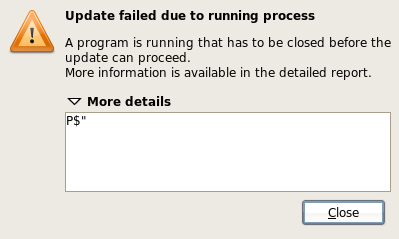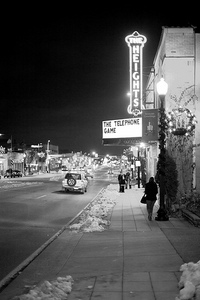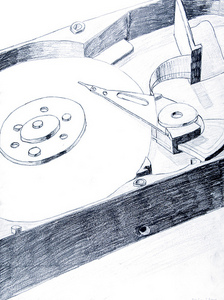I use Red Hat Enterprise Linux for my own hosting service and on nearly every server I interact with at my day job. So Fedora, as a spin-off of Red Hat, seemed like a logical choice. I chose Fedora 14, since it's the latest and I've heard good things about it.
Like Mac OS, Fedora comes with a good command line interface in the form of a bash shell and terminal application. It, of course, supports SSH out-of-the-box as well as X forwarding for remote X sessions and applications. Under Mac OS, I could emulate the middle-click "paste selection" function in Terminal with [command]-[shift]-v, which was great for pasting output from the terminal into my next sets of commands. Fedora seems to actually require a middle click or some futzing with the keyboard mapping to make one. I haven't dug into it too far, since my laptop keyboard includes a middle-click button next to the trackpad. It's a little annoying to reach over and hit the button but...it works.
Like Windows, X has problems with multiple monitors. On my Mac, I can plug in a monitor and it will turn on and become either a mirror or an extension of my desktop. The Displays preference pane controls which one and what arrangement they are in. If I connect a projector, months later it will remember how I set up that projector and will use the same configuration. Fedora...well...you have to log out and log back in to restart the X window server and allow the new monitor to be recognized by the system. The nVIDIA driver improves the situation a little bit, but not much. With nVIDIA, you don't have to log out and back in, but you might as well.
Unfortunately, using the nVIDIA packages brings up a new problem. Since the nVIDIA parts and the Fedora parts aren't always synchronized, sometimes a kernel update will break the nVIDIA parts and sometimes an nVIDIA update will break the nVIDIA parts. I've had both happen and both were not 'fun' to recover from. In both cases, the laptop would boot, but wouldn't start X. In one case I had to revert to the earlier kernel and in the other case I had to uninstall all the nVIDIA packages and reinstall them.
Strange things seem to happen with the Gnome desktop under Fedora. There's a fast user switcher menu in the upper right corner, next to the clock and calendar menu. Within a day of installing Fedora, all those menus had disappeared. This is apparently a known bug that nobody has bothered to fix. The way to keep it from happening is to disable Compiz, which makes the windows render more slowly. So you have a choice: a fast interface or a broken one.
I find myself using the Mac OS Dashboard for little things like checking CPU use, using the calculator, checking the battery on my wireless keyboard, and looking at the weather forecast. I didn't get much time to play with the Windows 7 sidebar, but in Fedora, I miss having a readily available calculator rather than a calculator application. I also miss having a weather report that shows more than just today. I usually have a terminal open, so I can use htop to see CPU usage or awk to do calculations, but it's not as convenient as the dashboard.
I've been told that Fedora handles software updates extremely well. I've found that to be mostly the case, though it's clearly far better than Windows. I don't think a single day has passed where I have not had at least one package to update. There's two ways to look at that I guess: either Fedora is really on top of fixing stuff or there's a lot of stuff to fix and it's really annoying to have to do it every single day. It's not a huge deal; usually I just run the updater 1, take whatever it gives me and go about my day as usual. Sometimes there's a second set of packages that has to update after the first (usually selinux-related) package. Sometimes it tells me I need to log out and back in to preserve system security and I go about my day as usual. Once I got this message though:

What's up with that? There's no useful information in that message. I even quit everything that was running and tried it again and got the same message. It only worked right after logging in after a fresh reboot.
I miss Apple's Mail(.app). It orders message threads intuitively. It figures out what messages with different subjects should be part of the same thread. It lets me instantly expand or collapse message threads from anywhere in the thread. It lets me instantly see what I typed as a reply to someone's email. It has an unread message count in it's dock icon. Thunderbird has none of these. Thunderbird adds space to subjects in threads until the subject disappears from my message list. Thunderbird makes me want to switch to using the Gmail web client.
The flash plug-in for Firefox has problems. Since I don't have iTunes on Fedora, I've tried some alternate methods of getting music to come out of my computer. Rythmbox works okay but obviously won't play any of my DRM protected music. So I've tried last.fm and other flash-based services and they, along with vimeo and youtube, all have the same problem. Flash will play fine if I don't do anything else (I use hulu to watch TV while riding my bike on a trainer stand with no problems) but if I open a new tab or switch between tabs in that browser window, it just changes to blankness and silence.
This one is a pretty tiny complaint but it really annoys me. The 'Pictures folder' screensaver pretty much sucks. The only thing it will do is show all the pictures from all the subfolders of your 'Pictures' folder. There are no options. If you have a folder you don't want to show in your screensaver, that's too bad. If you have a folder full of icons, expect them to show as super-pixelated, giant images. If you have a folder full of homemade porn, expect to show it to anyone walking past your computer when you're not there.
Tweetdeck crashes every other time I open it. It's a third-party application, so it's probably not the fault of Fedora or Linux, but it's a great example of the poor support companies give to this category of OS. It seems to happen whenever I'm opening more than one application at the same time more often than when I'm opening only one application. Maybe that's a sign of poor multitasking control under Linux or Gnome?
And my one, final complaint from the last month or so of using Fedora is: The Gnome Terminal seems to miss the obvious fact that, when I click on an active tab, I probably want to type in it. I can't count the number of times I've clicked a tab, started typing, sworn, clicked in the window, and re-typed whatever I just typed. Seems like a no-brainer to me, but maybe someone had a really good reason for doing it. I have yet to figure out the exact circumstances under which it happens and cannot repeat the problem on-demand.
1: Just now I was typing this and running the updater in the background. When it finished it popped a window in front of this one that took focus. Since I was typing I have no idea what it said because it was dismissed when I hit 'delete' or 'enter' or some other key. I hope I didn't break anything.
 A friend pointed me to a New York Times article about global hunger, food prices and the assertion that we're 'one poor harvest away from chaos.' In reading it, the sentence 'Some experts warned that the world could be on the verge of a "nightmare scenario" of cut‑throat competition for the control of shrinking supplies.' really stood out for me and started me thinking.
A friend pointed me to a New York Times article about global hunger, food prices and the assertion that we're 'one poor harvest away from chaos.' In reading it, the sentence 'Some experts warned that the world could be on the verge of a "nightmare scenario" of cut‑throat competition for the control of shrinking supplies.' really stood out for me and started me thinking.
A couple years ago, I was talking with a libertarian about poor people, school lunches, and taking responsibility for one's actions. I'll see if I can sum up some of his arguments...
Poor people have made a decision to get a job that doesn't pay well or to not work enough hours to make a living wage. Even if they didn't make those decisions directly, they chose not to get the education needed to qualify for a job that pays well enough. So either way, their lack of income can be blamed squarely on them. If these people then choose to have children the can't afford to feed, then they should be locked up for child abuse because they chose to have children they couldn't afford to feed. It's all their fault. The public shouldn't subsidize school lunch.
Now...I guess I can sympathize a little with that argument. Bad decisions shouldn't be rewarded. On the other hand, the state of sex education is horrid and I'm not sure it's fair to argue that having a child is always the decision of the parents. Sometimes it's really the decision of lobbyists who don't want their own children exposed to 'pornography' in school. Also, the cost of higher education is not tiny. Access to college is something that your own parents' income influences quite a lot. But I think most libertarians would run off on a tangent about the 'indoctrinated liberal elite' if I brought that up.
What brought me to this blog post was the sentence I quoted above. In a capitalist society, what determines the cost of food? I would argue that it's the people producing and, even more-so, selling that food. So, if you're going to allow the corporations that sell food to determine their prices and govern their profits, you're also allowing them to determine who is 'poor' and can't afford to feed their child. And, if you're going to allow corporations to determine who can't afford to feed their child, you're effectively allowing corporations to decide who gets put in jail for child abuse.
As I said before, I really do have sympathy for the libertarian viewpoint. That sympathy ends when human nature and greed take over and destroy the ideals.
(This doesn't even begin to consider the cost of food in countries that can't produce enough for their population or the repercussions of taking the libertarian dream to its logical conclusions in other situations.)
This was going to be another Mac in Exile post complaining about Fedora and their inability to keep my Nvidia card operating correctly, but after Bill Zeller's suicide, I had to write this instead.
At the end of the day yesterday, I read an article on Gizmodo (The Agonizing Last Words of Programmer Bill Zeller) that touched me and made me read it all the way through. Bill Zeller was a programmer and a geek and a fatally depressed person. He took his own life because he couldn't deal with what he called 'the darkness' any longer. His story is not unique, but it has gained wide coverage on the Internet since he is a bit of a celebrity here. I've saved his suicide note along with hundreds of other people. You should read it. It's long. It's painful. It's hard to deal with.
Below, I'm going to highlight some of the things that stood out for me.
My first memories as a child are of being raped, repeatedly. This has affected every aspect of my life.
Clearly, this is a more extreme case of sexual abuse than you usually hear about. But that's kind of my point. You don't hear about most cases of sexual abuse. The victim often continues on with their life as though nothing happened. They expect that they'll get over it eventually. They rarely do.
Alcohol and other drugs provided a way to ignore the realities of my situation. It was easy to spend the night drinking and forget that I had no future to look forward to. I never liked what alcohol did to me, but it was better than facing my existence honestly. I haven't touched alcohol or any other drug in over seven months (and no drugs or alcohol will be involved when I do this) and this has forced me to evaluate my life in an honest and clear way. There's no future here. The darkness will always be with me.
...
Last spring I met someone who was unlike anyone else I'd ever met. Someone who showed me just how well two people could get along and how much I could care about another human being. Someone I know I could be with and love for the rest of my life, if I weren't so fucked up. Amazingly, she liked me. She liked the shell of the man the darkness had left behind. But it didn't matter because I couldn't be alone with her.
...
I've told different people a lot of things, but I've never told anyone about what happened to me, ever, for obvious reasons. It took me a while to realize that no matter how close you are to someone or how much they claim to love you, people simply cannot keep secrets. I learned this a few years ago when I thought I was gay and told people. The more harmful the secret, the juicier the gossip and the more likely you are to be betrayed. People don't care about their word or what they've promised, they just do whatever the fuck they want and justify it later. It feels incredibly lonely to realize you can never share something with someone and have it be between just the two of you. I don't blame anyone in particular, I guess it's just how people are. Even if I felt like this is something I could have shared, I have no interest in being part of a friendship or relationship where the other person views me as the damaged and contaminated person that I am. So even if I were able to trust someone, I probably would not have told them about what happened to me. At this point I simply don't care who knows.
By this point in the reading I was thinking that maybe he could have talked to a therapist before going to the extreme of killing himself. Maybe cognitive behavioral therapy or mood-altering drugs or a combination or even talk therapy could have helped him out of his funk. But I know as someone who once thought about suicide, that when you're that depressed, you won't believe there's another way out. You won't believe that other people have felt that way, gotten help, and continued on.
You can see the effect that our society, our scandal-powered youth, and our rape culture directly effected his decisions. He had no reason to believe that people would view him as someone who had had horrible things done to him. He believed that he would be seen as damaged goods...'contaminated' and unworthy.
I feel an evil inside me. An evil that makes me want to end life. I need to stop this. I need to make sure I don't kill someone, which is not something that can be easily undone. I don't know if this is related to what happened to me or something different. I recognize the irony of killing myself to prevent myself from killing someone else, but this decision should indicate what I'm capable of.
I think it's safe to assume that he's talking about killing the person who did this to him. If it was me, I might think that this would somehow undo the damage that I'd suffered but I would know that wasn't true. I'd know that it wouldn't fix anything and would only make me feel better for a short while, like the alcohol did. After I'd executed my abuser, I would still feel the pain and the 'darkness' and there would be one less glimmer of hope for getting rid of it. On top of that, I would feel the remorse and guilt of having taken another person's life.
I did try to minimize pain, although I know that this decision will hurt many of you. If this hurts you, I hope that you can at least forget about me quickly.
There's no point in identifying who molested me, so I'm just going to leave it at that. I doubt the word of a dead guy with no evidence about something that happened over twenty years ago would have much sway.
You may wonder why I didn't just talk to a professional about this. I've seen a number of doctors since I was a teenager to talk about other issues and I'm positive that another doctor would not have helped. I was never given one piece of actionable advice, ever. More than a few spent a large part of the session reading their notes to remember who I was. And I have no interest in talking about being raped as a child, both because I know it wouldn't help and because I have no confidence it would remain secret. I know the legal and practical limits of doctor/patient confidentiality, growing up in a house where we'd hear stories about the various mental illnesses of famous people, stories that were passed down through generations. All it takes is one doctor who thinks my story is interesting enough to share or a doctor who thinks it's her right or responsibility to contact the authorities and have me identify the molestor (justifying her decision by telling herself that someone else might be in danger). All it takes is a single doctor who violates my trust, just like the "friends" who I told I was gay did, and everything would be made public and I'd be forced to live in a world where people would know how fucked up I am.
Rape victims rarely report their rape to the police. In fact, 74% of completed and attempted sexual assaults against females were not reported to the police. (source) and the statistics for men are even worse because of the belief that men are the rapists, not the raped. Also, the closer the relationship between the victim and the offender, the greater the likelihood that rape or sexual assault would go unreported.
His statements here are literally a textbook explanation for not reporting rape because of "Shame, embarrassment, or desire to keep the assault a private matter. Humiliation or fear of the perpetrator or other individual's perceptions. Fear of not being believed" (Du Mont, J., K.L. Miller, and T.L. Myhr. "The Role of 'Real Rape' and 'Real Victim' Stereotypes in the Police Reporting Practices of Sexually Assaulted Women." Violence Against Women 9(4)(April 2003): 466–486. Retrieved from the DOJ website.)
I'm prepared for death. I'm prepared for the pain and I am ready to no longer exist. Thanks to the strictness of New Jersey gun laws this will probably be much more painful than it needs to be, but what can you do.My only fear at this point is messing something up and surviving.
On a personal note, this is basically why I'm alive today and I think why a lot of people who would otherwise have killed themselves have lived long enough to get past their problems. The fear of being a permanently-injured-failure-who-can't-even-commit-suicide-correctly-and-everyone-knows-it pretty powerful.
I'd also like to address my family, if you can call them that. I despise everything they stand for and I truly hate them, in a non-emotional, dispassionate and what I believe is a healthy way. The world will be a better place when they're dead--one with less hatred and intolerance.
If you're unfamiliar with the situation, my parents are fundamentalist Christians who kicked me out of their house and cut me off financially when I was 19 because I refused to attend seven hours of church a week.
They live in a black and white reality they've constructed for themselves. They partition the world into good and evil and survive by hating everything they fear or misunderstand and calling it love. They don't understand that good and decent people exist all around us, "saved" or not, and that evil and cruel people occupy a large percentage of their church. They take advantage of people looking for hope by teaching them to practice the same hatred they practice.
I know that a lot of people out there are going to say "well...he wasn't a Christian, he broke the laws of the Bible, it's no surprise he committed the sin of suicide." I reject that notion the same way his Christian parents rejected him.
Since being kicked out, I've interacted with them in relatively normal ways. I talk to them on the phone like nothing happened. I'm not sure why. Maybe because I like pretending I have a family. Maybe I like having people I can talk to about what's been going on in my life.
This feeling of wanting normalcy is par for the course for humans. Something bad happened and if you ignore it, maybe it will go away. It won't. We need to confront it and put it in the open. It's painful and sometimes hurtful, but the conversation needs to happen. This is even more the case with rape victims. Bill Zeller stayed quiet about it for 23+ years before finally killing himself. That's the wrong way to go through life.
I've seen some people saying that Bill Zeller was a coward for taking his own life and not 'manning up' or whatever. This is a huge problem with our society. Bill Zeller was raped. He took his own life. In my eyes, the rapist effectively murdered him.
Now that I've had time to get my new Dell set up, I'd like to talk a bit about operating systems. I know that some people prefer Mac and some people prefer Linux and some people even prefer Windows. I know that everyone has their reasons for choosing one particular OS as their favorite. These are just some of mine.
 Windows 7: This machine came to me loaded with the approved set-up of Windows 7. Our desktop support folks did a fine job of installing the OS, binding it to the domain, and giving me a local administrator account so that I could actually do my work. I told myself and others that I was going to give Windows 7 a chance. I said I'd try it out for a week and see what happened. That lasted about two hours.
Windows 7: This machine came to me loaded with the approved set-up of Windows 7. Our desktop support folks did a fine job of installing the OS, binding it to the domain, and giving me a local administrator account so that I could actually do my work. I told myself and others that I was going to give Windows 7 a chance. I said I'd try it out for a week and see what happened. That lasted about two hours.
My first problem was that I use SSH connections to servers to do the vast majority of my work. Windows 7 does not have a built-in SSH client. Windows 7 is stuck in the stone age with a built-in telnet client instead. Luckily, there are several options for third-party solutions to this flaw. Putty is the approved software package for SSH connections on Windows and was available for me to install through "Advertised Programs" so I didn't even need to escalate my local permissions to do it. Putty uses the same text interface as the Windows command line. That is to say, it's stuck in the stone age without the ability to effectively copy and paste text. Sure, the option is there, but it's not as simple as point-and-click.
My second problem was that I use X forwarding over my SSH connections to monitor server activity using tools like jconsole. At the moment we're doing a lot of load testing on one of our major applications, so it's pretty important that I be able to monitor performance during these tests. Putty does not support X forwarding. Neither does Tectia, the other, somewhat-approved ssh solution (not free). At this point I started to venture into less approved methods and installed Cygwin as a virtual Unix-like environment in order to get the built-in X support it has. Unfortunately, the approved Windows 7 installation is so locked down for security that X forwarding requires OS acrobatics that are not worth the time.
I hadn't even gotten to the point of plugging in an external monitor and dealing with the tribulation that involves. I did notice that there was an icon on the desktop for "connect projector" and thought "there's an app for that?" The Aero window effects were cute, but they did sort of obscure the title of the windows. I couldn't find anything equivalent to Mac OS's Expose, but I didn't look too hard. I guess [alt]-[tab] is supposed to be better in Windows 7 and show you the windows or something? Fundamentally, the first two problems alone required enough un-official changes to my machine that I just decided to install Fedora 14.
My day job has some interesting ideas about saving money. This year, we're getting to take three unpaid days off in the form of a furlough, even though many economists believe that furloughs don't save money.
 This year was the fourth year I had my MacBook Pro and I've known I was going to have to give it up for a cost-saving Dell with Windows 7 installed at some point. That point was last week.
This year was the fourth year I had my MacBook Pro and I've known I was going to have to give it up for a cost-saving Dell with Windows 7 installed at some point. That point was last week.
I told myself and others "I'll give Windows a chance. I'll give it a week and see if I can get my job done using it." As it turned out, I gave it about 2 hours and installed Fedora 14. I considered making it into a Hackintosh, but I decided that wireless networking was more of a necessity than having a good OS.
I've heard a lot of people complaining about Apple computers and other hardware being more expensive than equivalent hardware from other vendors over the years. The real problem with these anti-Apple arguments is that you can't determine equivalence based on hardware specifications alone. My MacBook Pro cost about $2200 had a Core2Duo processor at 2.33GHz, 200GB HDD, 3GB or RAM, 256MB ATI video and was made in 2006. This laptop cost about $600 has a COREi5 CPU at 2.66GHz, 160GB HDD, 4GB RAM, 512MB Nvidia video and was built in 2010. Here are my first impressions of the device.
Graphics: The screen is washed out, even in comparison to a Dell monitor sitting next to it and powered by it. And by "washed out" I mean the contrast is terrible and the colors are as saturated as downtown Minneapolis looks today. I'm happy to report that Fedora supports color calibration hardware out-of-the-box but I haven't tried that out yet.
Human/Computer Interface: The track-pad is slightly textured in such a way that I'd get a callus on my finger if I had to use it all the time. The scroll areas on the right and bottom of the track-pad are not aligned with the printing on the surface that indicates the locations of the scroll areas. The track-pad is not multi-touch and therefore requires these scroll areas to accomplish one of the most basic functions of computing. It also necessitates additional buttons for right-click and middle-clicks. Despite requiring extra area for scrolling, the track-pad is minuscule in comparison to my MBP.
Connectors and Ports: The power connector is in the back, which hasn't been convenient since the early 90s. Neither Windows nor Xorg under Linux are able to dynamically recognize and add or remove external monitors or projectors when they plugged in (admittedly a problem with the OS, not the hardware (Mac OS has always handled external monitors very gracefully on the fly)). This is ridiculously frustrating for the road warrior in me, since I have to log out of my machine every time I change my monitor configuration. I'll give Dell (and most PC laptop manufacturers) points in this area for supporting two external monitors, but I was quite disappointed to discover that the internal monitor is non-functional when I use both monitor ports. EIDE is great, I support that move, not that I'm going to ever use it. The firewire port seems to be an after thought, which is just as well since it's the un-powered mini-port and the original firewire rather than FW800.
Build Quality and Industrial Design: The plastic body feels cheap and fragile. The ridiculous amount of empty space around the screen means the laptop is very large for it's screen size. My Mac is about the same dimensions and has a 15" screen where this one has a 14" screen. The extended battery is huge, sticks out the back, and only gives it slightly longer run time. There's a physical switch on the side of the machine to turn the wireless card on and off. Is software not good enough for this? The CD drive has a tray, which takes up unnecessary space compared to a slot loader.
Performance: The modern, 4-core CPU does not seem to perform as well as the 4-year-old, 2-core CPU in my old Mac. This could be due to using BIOS (1970s technology) in favor of EFI, or it could be that the operating systems I've used on it are less efficient than Mac OS, or it could be that Mac OS is tuned toward the appearance of speed rather than actual speed. I know that part of it is that Linux has poor support for Nvidia...or does Nvidia have poor support for Linux?
Future posts on this topic: "Why Windows 7 Only Lasted 2 Hours", "Fedora v. Mac OS X"
Last week, I went to the premier of a local film called The Telephone Game. It was better than you'd expect a local film to be. Read more at Almost Diamonds.

Sunday night, my washing machine broke. I was playing Red Dead Redemption when there was a loud BANG! from the basement followed by a thudthudthudthudthudthudthud! The drum was wobbling inside the washer and things didn't look good. The last time I had a washer do anything unexpected on me, it resulted in a new washer.
So I went to the Sears repair website, since that's where it was purchased, and was surprised to see:
$129.00
It’s just that simple.
This is the total charge for our visit and labor (part costs not included). No hourly rate, no hidden fees.
So I ordered some of that up.
Now...I had misread this of course. "visit and labor" caused me to skip right over "part costs not included" but the labor is really what kills you on this type of repair; the parts are all cheap.
Turns out that Sears pads the price of their parts so that they can make money on them. $660 for a bearing and a support is stupid expensive. So I paid the $129 and let the guy out. Today I buy a new washer and Sears has left a bad taste in my mouth.
(The parts on Sears "Parts Direct" website total under $200 $350)
Update: I called Sears repair. Since the quote has no actual part numbers, they can't verify that the price is different. They offered to send another tech out to get the part numbers, but can't do that until the service order is closed tonight when the original tech completes his callls for the day. That means calling tomorrow for a tech to show up on Friday or Saturday since Thursday is a holiday.
Update: When I twat a link to this article, I received a tw@ back from @searscares stating
I'm Scott w/Sears. I'm sorry for the frustration. Plz email us @ smsupport@searshc.com.
I checked to see that searshc.com is owned by the same folks that own sears.com and sent them an email today at 10:30. It's now 16:30 and I have heard nothing back. I have sent a follow-up email letting them know I'll be buying elsewhere.
Update: Sears corporate has successfully contacted me after the person who was going to call me left unexpectedly. I have received an appology and will be receiving a refund of my $129 due to their lack of ability to promptly help me. I appreciate this and will continue to shop at Sears, but may remain tentative about using their repair service. I've also been given a special phone number for the corportate office that I can call if I need anything else. So that's a good thing.
 I recently gave some real-world reasons for passing net neutrality laws. Today News Corp has joined the list of companies to step over the line from defending themselves to offending their customers. Gizmodo has the details.
I recently gave some real-world reasons for passing net neutrality laws. Today News Corp has joined the list of companies to step over the line from defending themselves to offending their customers. Gizmodo has the details.
When the clock struck midnight on Saturday, Cablevision customers could no longer watch FOX on their TV. That's because News Corp. (which owns FOX) and Cablevision couldn't come to an agreement on the fees that Cablevision should pay News Corp. It's something that's happened before with other networks and other cable providers but the new twist is that News Corp. is using their stake in Hulu to ban Cablevision Internet users from accessing FOX content on Hulu as well.
When can we get some sense? If cable and television providers keep messing with their customers, their customers are going to learn to use bittorrent real fast. Net neutrality isn't just for protecting consumers and small content providers, it's for protecting everyone.
You've seen the Old Spice guy commercials:
You've probably seen the Old Spice guy answer questions on the Internet:
You might have seen "Smell Like A Monster:"
And now you can see why geeks are hotter than that Old Spice guy:
 There's been a lot of talk about net neutrality since Google and Verizon produced a joint proposal on the subject that basically would allow wireless carriers a big old backdoor out of net neutrality.
There's been a lot of talk about net neutrality since Google and Verizon produced a joint proposal on the subject that basically would allow wireless carriers a big old backdoor out of net neutrality.
"So what is net neutrality?" you ask.
In basic terms, net neutrality is the idea that the companies that run the Internet, the big backbone data pipes that get websites and other content from East Wherever to your desktop, laptop, or mobile phone have to treat all data the same. That means that Google shouldn't be able to pay Sprint extra to move their data to you faster than Bing or Yahoo.
"What's the problem with that? If Google wants to pay extra for premium service, that's the free market, right?"
That's exactly the point of debate right now...sort of. The people who are against net neutrality regulations are basically saying that a. it's not a problem b. because it hasn't happened yet. So the questions are a. why would it be a problem? and b. should we stop it before it happens?
To simplify the problem, lets look at a more real-world analogy. Lexus makes moderately expensive cars. People buy a Lexus for a lot of reasons, just like people use Google or Bing for a lot of reasons. What if Lexus paid a company that makes stoplights to build in mechanism that would make their lights turn green faster if there was a Lexus waiting in line? Would that be a problem? What if they also added a feature that would make the light turn slower if there was a Honda waiting in line? This is achievable with current technology. It hasn't happened yet, and it probably won't, but it's not outside the realm of possibility.
As far as stopping it before it happens, in 2007, it was discovered that Comcast was intentionally throttling BitTorrent traffic (peer to peer file sharing) in order to cut down on the need for more bandwidth to their main data centers. Now, this is an interesting case because it only really affected Comcast's direct customers, but it's one of the big ones out there right now. So how has this "not happened yet?"
My fear is that if Comcast can get away with this, we'll see Google and Yahoo and Bing in bidding wars with Comcast and NetZero and other Internet service providers to make their service seem like a better service because it's "just faster." From there, it's not much of a stretch for Bimbo Bakeries to pay GE to build toasters that make a perfect Thomas' English muffin every time, and always burn Bays.
Comics
AppleGeeks
The Awkward Yeti
Chainsawsuit [new!]
Ctrl+Alt+Del
Doghousediaries
Doonesbury
Formal Sweatpants
FoxTrot
Happle Tea [new!]
Hyperbole and a Half
Indexed
Joy of Tech
Kate or Die!
Lunarbaboon
Our Valued Customers
RealLife
Romantically Apocalyptic
Saturday Morning Breakfast Cereal
Scenes From A Multiverse [new!]
A Softer World
Sci-ence
Sinfest
Three Panel Soul
Wondermark
XKCD
Blogs
Almost Diamonds Antihero As I See It Black and WTF Caerwyn Farm and Spirits The Catty Life Domestic Sluttery Engrish For Goodness Sake Gizmodo Greg Laden Le Zèbre Bleu Lefse and Kimchee Lifehacker Light-test Linux in Exile Man Bytes Blog Photography is Not a Crime Post Secret Photoshop Disasters
Arts
New Pictures 8: Sarah Jones
Minneapolis Institue of Arts
04/18/2013—02/02/2014 - Free
31 Years: Gifts from Martin Weinstein
Minneapolis Institue of Arts
11/02/2013—08/31/2014 - Free
New Pictures 9: Rinko Kawauchi
Minneapolis Institue of Arts
02/20/2014—08/10/2014 - Free
Finland: Designed Environments
Minneapolis Institue of Arts
05/10/2014—08/17/2014 - Free
Music
Nick Cave and the Bad Seeds
at State Theatre
06/21/2014 \ Doors 8:00pm
Please wait while my tweets load